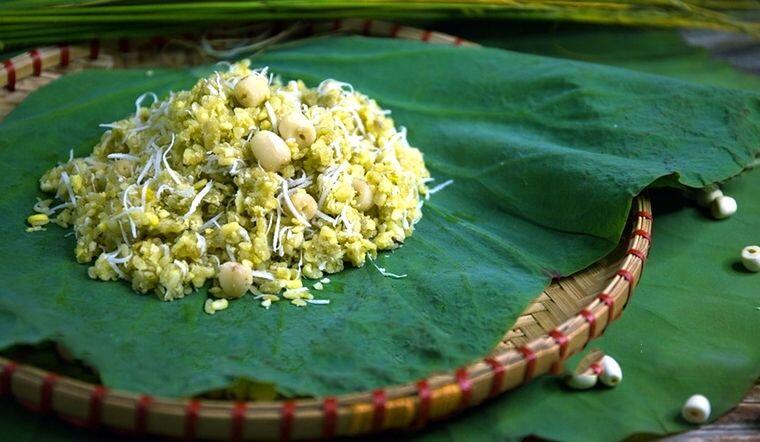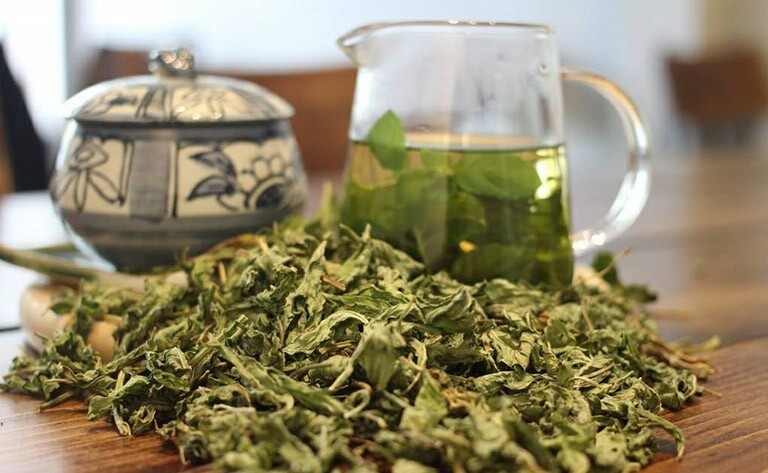MSc, MD. Kieu Xuan Thy, Deputy Head of Campus 3, Ho Chi Minh City University of Medicine and Pharmacy, revealed that scientific studies have shown that lotus leaves can reduce total cholesterol, triglycerides, and LDL-C, while increasing HDL-C (good cholesterol). Some key active compounds in lotus leaves, such as nuciferine and flavonoids, possess antioxidant properties, preventing the oxidation of LDL-C, one of the primary causes of atherosclerosis and cardiovascular diseases associated with high blood fat levels.

Lotus leaves are abundant, but in Vietnam, they are mostly used for food packaging. Illustration.
Citing a study published in the Journal of Ethnopharmacology, Dr. Thy explained that the research demonstrated the lipid-lowering effects of lotus leaf (Nelumbo nucifera) water extract in patients with high blood fat levels. Specifically, after using the extract, patients exhibited reduced total cholesterol and triglyceride levels while experiencing an increase in HDL (good cholesterol) levels.
While the studies indicate the positive impact of lotus leaves on lowering blood fat, Dr. Thy cautioned that these effects may vary depending on individual body constitutions and health conditions. “The use of lotus leaves as a complementary approach to treating high blood fat should be done under the supervision of a doctor or healthcare professional, and it should not be considered a complete replacement for modern medications or therapies”, advised Dr. Thy.
According to Dr. Thy, in traditional medicine, lotus leaves are known as ha diep, possessing a bitter taste and a neutral nature. They are associated with the Heart, Spleen, and Liver meridians. Lotus leaves are commonly used for heat clearance, reducing dampness, weight loss, and promoting blood flow. Notably, when used for lowering blood fat, lotus leaves help regulate the body’s fat balance, improve the function of the Liver and Spleen, and dissolve phlegm, which is believed to be a cause of high blood fat.
Despite the numerous health benefits, Dr. Kieu Xuan Thy advised some precautions when using lotus leaves:
– Dosage: For optimal results, consume 5-10 grams of dried lotus leaves infused in water daily. If using fresh lotus leaves, increase the dosage to 15-20 grams. However, avoid excessive consumption.

Consume lotus leaf water in moderation and avoid excessive intake. Illustration.
– Contraindications: Individuals with weak spleen and stomach, cold diarrhea, and pregnant women should use lotus leaves with caution or avoid them altogether. Lotus leaves have a cooling effect, and excessive consumption can lead to impaired digestion, especially in those with weak constitutions.
– Drug Interactions: Lotus leaves may interact with certain medications, particularly anticoagulants or cardiovascular drugs. Therefore, caution is advised when combining them with other medications.
– Long-term Use: While lotus leaves offer multiple health benefits, they should not be used as a complete replacement for drinking plain water daily. Consuming lotus leaf water continuously instead of plain water can disrupt the body’s yin and yang balance, affecting digestion, causing stomach coldness, diarrhea, or low blood pressure.
The Secret to Fluffy, Voluminous Eggs: A Simple Trick to Double Your Breakfast Delight
The humble fried egg is a favorite among many, especially children. A simple dish, yet so versatile and satisfying – just a couple of eggs, a dash of seasoning, and a quick 5-minute fry is all it takes. The golden, runny yolks are a delight, whether paired with toast, plain rice, or even sticky rice. A true comfort food, fried eggs are a quick and easy way to brighten up any meal.



































